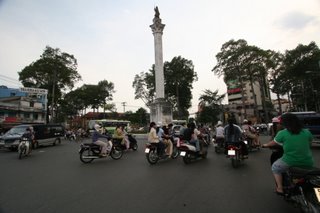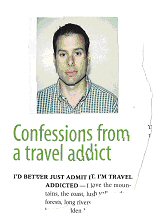Saigon, Easter Sunday
 ("Chanh")
("Chanh")No Easter eggs to hunt, I set afoot to explore Saigon (now referred to as Ho Chi Minh City). The city maps and lonely guide in hand, I plotted the sights of interest and areas of cultural richness. Flying into the city on Saturday night, my head was spinning from all of the bright lights and city slicker action. My experience in Vietnam thus far had been tame with early restaurant and shop closures mandated by the government, but Saigon seemed to have an immunity, or at least a longer leash, from such restrictions.
Saigon, city of almost seven million people, is no stranger to capitalism, in fact, it may be more capitlistic than the economies of the West, as the US Dollar is king. Bribery is abound in the government, so much so, that seats in the ministry and parliment are actually bought and sold behind closed doors. You want to be Minister of the Interior? Pay $1 million US Dollars and you may just be able to buy the necessary votes from the powers that be. It may sounds like a stiff price tag, but over the course of five years, you are bound to make at least $1 million each year.
The difference between Hanoi and Saigon reminded me of the development differences between Western and Eastern Europe during the Cold War. Hanoi is a tame controlled kitten compared to the giant tiger of Saigon. With the likes of shops such as L'Occitane, Tods, Prada, Addidas, Nike and Rolex, Saigon's residents are more fashion and brand conscious than one would expect in a communist country. But as I've come to learn, about the only thing communist about Vietnam is the politics, not the economy. Vietnam's largest city, Saigon, is an emerging market with a cheap labor force and a lot of resources and cash.
Easter under full swing in Saigon, I left the hotel planning to walk much of the city on foot, but within steps outside, I was approached by a cyclo driver offering to peddle me around the city for 50,000 Vietnamese Dong ($3.20) per hour. His price was too high and I wanted to walk which I did for several blocks, until I was approached by another cyclo driver, this time for 30,000 Dong the first hour and 25,000 Dong each hour thereafter. Desiring to walk, he handed me a laminated piece of paper with broken english typed onto it. It stated that he fought in the Vietnam War for South Vietnamese Army next to Americans. When the Americans left in 1975, he was imprisoned for nine years, during which he was tortured at various times.
Chanh (last name withheld to protect his identity), now 52 years old, was skin and bones weighing no more than 135 lbs and missing most of his teeth. His story was compelling and I had heard that some Vietnamese veterans were cyclo drivers as that was all the government would permit them to do. To this day, those identified as S. Vietnamese supporters thirty years ago are not permitted to live in certain Districts of Saigon, nor are they permitted to obtain a license to drive a car or motorbike, less strenuous and higher paying options.
Chanh began peddling me about town, talking non-stop about the war, the communist government and his life since the end of the war. It was a brutal story, losing his parents while he was imprisoned, losing all of his possessions and being relegated to a cyclo driver as the police would not let him do anything else. I wanted to understand every bit of his story, but it was difficult to make out what he was saying as he repeated every word twice and spelled every third word, sometimes correctly, sometimes not. It felt more like 1976 than 2006, the war was still fresh in his mind as if he relived it everyday.
 ("Chanh" looks at city map to plot our next stop.)
("Chanh" looks at city map to plot our next stop.)He peddled me through several districts of Saigon pointing out Pagodas, China Town, and buildings where significant events took place during the war. I was surprised at the strength and skill he demonstrated maneuvering the cyclo through intersections where motorized vehicles appeared from all directions. Riding in a cyclo for a few hours in Vietnam is a must as you get a front seat view of the action on the streets with motorbikes, buses and cars whizzing by.
However, a few hours into the ride, I was tired just from trying to make sense of his tour chatter and we parted ways. I didn't get to walk as much as I wanted, but I got a lot of mileage in understanding the Vietnam War from the South Vietnamese persepective, one of great suffering and enduring consequences for decades, or perhaps a lifetime.
 (View from the cyclo.)
(View from the cyclo.)Easter dinner found me in an Art Gallery Cafe feasting on a Caesar Salad and Veggie Sandwich. Just outside the cafe, thousands of motorbikes with men and women locked in arms rode past. Sunday nights were big for getting out and about with your girlfriend, boyfriend or spouse. The city was alive with motorbikes buzzing around the streets of District 1 as if circling the hive. It seems cruising on Sunday nights is a favorite city passtime.
Before retiring to my hotel, I went to a Western style bar, literally Western, like cowboy shoot 'em up. Inside a travelling Phillipino band belted out solid cover songs spanning 50 years. The crowd was a mix of expats and locals. One man came in with his laptop case, taking one of the few empty seats near me. Now a big fan of the nationality guessing game, I thought he might be American. Curiosity driving me, I asked him where he was from. Turns out he was American, last place of residence, Boston, but moved to Vietnam one year ago to start his own securities firm. Steven was about my age, and as he explained it, was pursuing a career in the Wild West. By his estimates, the Vietnamese economy is getting hot and his research is being used to attract hundreds of millions of dollars.
Steven gave me some inside scoop on the country, the culture and the government. He is careful with what he writes in his e-mails and has a local Vietnamese person engage in the normal course of bribery to make things happen. Sometimes he knows he is followed, other times he is not sure. As he explained it, it all has to do with the "high profile" nature of you or your actions. With a new business budding, he intended to play the "party" line to capitalize on the booming market. He was taking a lot of risk in starting a business in a country where the government has complete autocratic control. But the Wild West had its challenges and the potential for another gold rush was too good for him to pass up.


<< Home